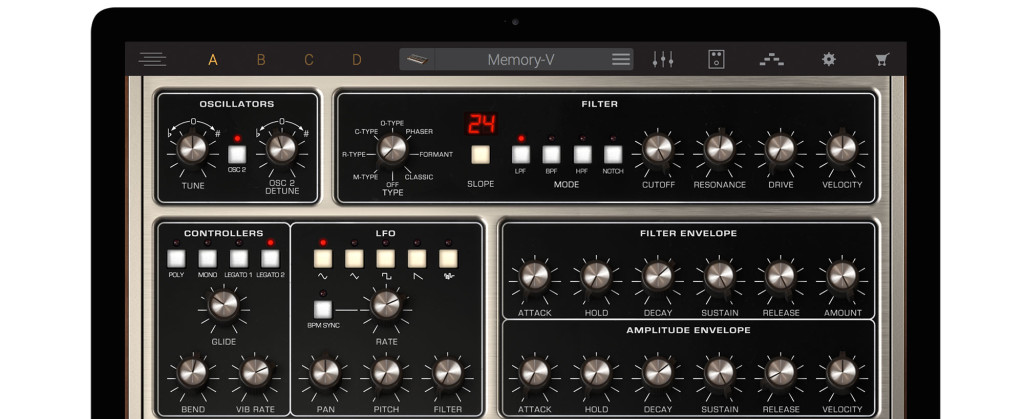No obscure Moog synthesizer past is left out – it’s like a party. The latest is IK Multimedia, the 1981 Moog Memorymoog, and – it’s available for free (with mailing list sign-up).
Memorymoog what now? Well, from 1982 to 1985 (it was announced in ’81 but I believe mainly shipped from ’82), the original Moog Music company made this polysynth behemoth.
Just to review – you didn’t dream that, we were just talking about the Polymoog. The difference with the “poly” part of that is, that instrument used divide-down trickery to get more voices.
But the Memorymoog had six true, independent voices – actually even 3 oscillators per voice – plus presets. It was a bit like 6 Minimoogs crammed together. A later version added MIDI. But that didn’t allow Moog to keep up with much more practical, reliable, affordable, and compact digitally-controlled instruments from KORG and Roland. Resulting from this and various other pressures of the market at the time, the company wound up bankrupt. (This was a different Moog company, no longer helmed by Bob Moog himself – though he would ultimately reclaim the name.)
There’s a wonderful history here, by someone working on these old dinosaurs:
The MemoryMoog (Plus): American Monster Polysynth [Bell Tone]
The Memorymoog is clearly the winner for someone who says “if only this Jupiter-6 were made of Moogs.” It even looks like the offspring of its namesake.
The beauty of having a software recreation of the Memorymoog is, you get all the sound design possibilities of the original – and even the chance to model some of its idiosyncrasies – without acquiring an unreliable giant that requires its own transport.
This freebie comes with a full 5 GB of samples plus 148 instrument presets and 4 multis. (Whoa.)

Oh, yeah, and it’s free. Not that anyone is ever likely to remake a Memorymoog, and you’d have to be fairly daft to get a used one (though some people do go there, and I’m jealous of whoever won the Moog Foundation competition). But free makes this a must.
When the going gets tough, the tough make really big pads.
Memory-V is an add-on for IK Multimedia’s Syntronik instrument. That instrument takes a hybrid approach to remaking retro classics, by combining multi-sampled content with a modeled filter section. They also have their own technique for modeling how oscillators would misbehave and drift, which they call “DRIFT™.” You know – the thing that for years synthesists dreamed would stop happening. Now we want to recreate it.
For all the choices out there – and there are a lot of choices – Syntronik also can recommend itself with 4-part multis (whoa), splits, and arpeggiators.
That makes them a rival of course to Arturia who have their own V Collection with a similarly broad catalog of recreations. The trick is, they now have a sale on for up to 70% off, which makes the price of Syntronik 99 $/EUR.
But whether or not you’re ready for all that, you can go ahead and get Memory-V for free – and it runs in the free version of Syntronik, too, so your total cost can be zero. If you’re already on IK’s mailing list, you just go grab it.
And oh yeah, of course, like everyone is doing now, there’s some omnibus installer thing that’s meant to manage all your licenses and download updates. This one is called IK Product Manager.
Here’s how:
Before we even think of complaining, though, I might observe that we have an insane, stupid, wild, incomprehensible selection of sounds that now run on computers. You could freak out your friends by getting really great studio monitors, one very tiny controller keyboard, a wraparound monitor, and then filling the rest of your studio with potted plants. (I don’t know what that would do for sound diffusion, but it would increase the amount of oxygen. Well, depending on what kind of plants you were growing but – no comment there.)
Seriously, though, it is spectacular having these choices of sounds. And while some people go have existential crises about what that means for the future of music, I’m perfectly happy because people seem to have different ideas.
And for still more from the Moog of this time:
It’s funny, now that people have gotten their fill talking about Moog modular and Minimoog, it seems there’s resurgent interest in some of the lesser hits of the era. I always think we learn from history, even in our efforts to be more futuristic, so bring it on.